
Alan Fletcher: “I don’t mind if someone turns up expecting me to be rubbish, it’s just really important to me that they don’t think I am by the end”
The iconic Neighbours actor chats to us about performing music on the show and the writing of upcoming album ‘Dispatches’
For over 27 years, Alan Fletcher has played fans’ favourite Dr Karl Kennedy on the popular Australian television show Neighbours. The show that helped launch the careers of megastars such as Kylie Minogue, Natalie Imbruglia and Margot Robbie will soon be coming to an end. Though bidding farewell to such an important period will undoubtedly be a strange time for Fletcher, it does present him with an opportunity to pursue his other big passion in life, music.
While the music performed on Neighbours by Dr Karl might be something the other characters will do anything to avoid, Fletcher’s own songs are the work of an artist who takes his songwriting seriously and is dedicated to improving his craft. Having previously performed and recorded rockier material with his band Waiting Room, his new songs have a dusty Americana quality to them that suits his affinity for storytelling. With the singles Sorry Is The Word and Meet Me On The Steps Of The Bombed Out Church (a cover of a Silent Sleep song) having dropped already, we’re looking forward to hearing his album Dispatches when it’s released later this year.
In the meantime, we dropped by for a songwriting consultation with Fletcher…
Click here for more interviews
Did you grow up in a musical household and was music a big part of your childhood?
“No, not really. There was a piano in the house. Occasionally dad would play but he was always so busy. We hardly ever heard him play it. My mum gave me a guitar when I was 14. I learned three chords and then spent the rest of my life playing those same three chords. I might have learned some bar chords, but essentially I’ve been noodling around on a guitar for years and years.
“As an actor, I primarily worked in music theatre and doing swing concerts and things like that. The idea of playing in a rock band was completely foreign to me until I met up with [eventual Waiting Room members] Tommy Rando and Chris Hawker one night at a function. They said, ‘Get up and have a sing with us,’ and we then said, ‘We should form a band.’
“The fame of Neighbours was such that the band could play residencies at the Neighbours night in Melbourne. We played every Monday night, which is a great way to develop your chops. When you’re playing in front of 300 people every week, you really start to develop some stagecraft. At the same time, both Chris and Tommy are great writers and I’ve always fancied myself with writing, particularly with lyrics, so we very quickly crafted an album, which we released in 2005, called In The Waiting Room.”
Was that your first attempt at writing songs?
“The very first time I wrote a song was for a Neighbours episode. They wanted to have a karaoke competition, like a talent night, and because copyright is so expensive in TV, they said, ‘We’re gonna get you to sing She’ll Be Coming Round The Mountain.’ I said, ‘That is so naff. Why don’t you let me write you a song and I’ll give it to you copyright free.’ So I wrote a song called The Drovers Last Dream, which I performed on a major television show here and it’s resurfaced for me and I’ve re-recorded it for this album. It’s basically a bush ballad about a drover’s last night on earth. I’m still very proud of the song. That was my first, probably about 1996. Then a big gap to 2004.”
With your busy schedule, do you carve out time for your writing or do chords and words just appear when you’re going about your day?
“When I was working with Waiting Room, we approached it like professional writers. We locked ourselves away in a room and everyone would bring in what they had. Sometimes Chris might sit down at the piano and just start playing something. I found that lyrics often came to me out of the mood of the music. Whereas when I’m writing country music, because it can be quite simple, I find the subject material of the song becomes the first step and then finding the musicality of it comes after that.”
And with a song like Sorry Is The Word, how does your writing process tend to work?
“Sorry Is The Word comes from a life lesson taught by English philosopher, Alain de Botton. My wife and I saw a lecture he gave about love and it was incredibly illuminating. It said to the audience that we are all flawed and the only way we can possibly stay in love is to accept each other’s flaws. I thought, yeah if you think about my life, the only time I’ve ever had real emotional problems in my marriage was because I’ve had too much pride. When I haven’t turned around and said, ‘Okay, you know what, I’m sorry.’ This song is about couples who still love each other but drift apart because neither of them can find the word ‘sorry.’”
Were you listening to that lecture thinking it could become a song, is that something that often happens?
“In that case, it didn’t come along until much later, but you’re actually completely right. Because I’ve got an acting background, one of the fatal flaws for actors is that they can be in the middle of a really emotional experience… you can be at a funeral, you’re listening and you’re sobbing, the tears are pouring down your cheeks and part of your brain suddenly goes, ‘Remember this, bank that.’
“Or someone might say something or I’m walking the dog and I see a little kid running across the playground and laugh with joy and I’ll grab my phone. Like anyone who writes music, my phone is full of voice memos; two lines or four lines. It’s just a funny process. I religiously get those four lines and I put them into a folder with a name. In my songwriting file, there’s like 50 folders of song starts.”
And that’s how the new album came together?
“I got really lucky. I was at the Tamworth Country Music Festival in 2019 and I was doing a John Prine tribute show actually. There were a couple of guys there who are very pre-eminent in the Americana field here. One was Lachlan Bryan and the other was Damien Cafarella. Lachlan Bryan is the frontman of Lachlan Bryan & The Wildes, I went to see them at a gig and we got talking afterward and we really clicked. They said, ‘You know what, we’ve got a production house, why don’t you come and do some music?’ It took me until Covid to do that, but that’s where a lot of my writing started to really flower.
“Lachlan Bryan’s lyric-writing is exceptional. He distils everything so beautifully and it’s so economical. Sometimes we’d go to his house and he’d say, ‘What have you got for me,’ and I put two virtually complete songs on the table and we would sing them together and in the gentlest, most supportive way, he would just move the song about a little bit. Take it to another place.”

Alan Fletcher (left) with Alyce Platt who features on his song Sorry Is The Word: “The very first time I wrote a song was for a Neighbours episode”
Are there any particular examples that you can think of where that happened and how it improved the song?
“I wrote a song which was about my mum. She was a spiritualist and believed in reincarnation. She meant so much to me as a guide and I wrote a song basically saying, ‘Hey, Mum, I can feel you looking down on me. Are you really there, show me something to make me believe that what you told me was true?’ Lachlan said, ‘I love it but I actually think it needs to be not just about a mum. Let the audience wonder who it is.’ It’s better that way. Interestingly, I think one of the reasons why country and Americana music is so good and people love it, is because it’s very specific. The songs are about dogs, wives, lovers, mothers… Ironically, in this case, generalising was purposely going against that grain, but it still feels specific doing it that way.”
Country music can be very specific but also very universal at the same time. How do you learn to do that as a songwriter?
“It’s about looking for authenticity. If I come up with a line because it sounds clever, then someone’s likely to turn around go, ‘That’s a clever line but it doesn’t necessarily have authenticity to it.’ Let’s go back to John Prine, he says [on In Spite Of Ourselves] ‘She don’t like her eggs all runny / She thinks crossin’ her legs is funny,’ and she says he, ‘Drinks his beer like it’s oxygen.’ Straightaway, I can see this guy and I can picture that woman.
“So basically, you got to stop yourself trying to be a clever Dick. Having said that, I love wordplay and one of my favourite songs is actually a sort of a Prine-ish song called Spend A Little Time With Me, where I deliberately word-play through the whole song because it’s a comedy song. I have another song, which my wife and I kind of wrote. She wrote her version, I wrote mine. We love having a lie-in in the morning and it became a kind of expression in our house to say, ‘How good is bed?’ I played it for the first time at the Tamworth gig and it was universally liked. There’s some mucking about with words in that as well.
“I think I’m possibly the first person to get the word ‘somnambulistic’ into a song… ‘My somnambulistic tendencies that you ridicule are the only exception to the golden rule that life is generally better in bed.’”
Have you been writing other songs with your wife?
“We were in Tamworth between gigs and we were sitting back at our hotel while I was getting ready. We were reminiscing about the fact that she’s still got the plastic giraffe from the first cocktail I bought her about 36 years ago. We smiled about that and I picked up the guitar and we started writing a song about that giraffe. We got a verse and a chorus into it. She contributed and I contributed but we were supposed to be on stage in 15 minutes. So we rushed out the door. I found that again today, on my phone, I’d kind of forgotten about it.”

Alan Fletcher: “Sometimes the acting can get in the way”
We’ve focussed a lot on the words so far, but what can you tell us about the point where you’re putting music to your lyrics?
“I need a bit of help there because I have a tendency to fall into patterns of writing. The other half of the Lachlan Bryan duo is Damien Cafarella. Damien is a songwriter himself, an exceptional producer and he’s also a multi-instrumentalist. So when we record, Damien will go in and put down the drums, come out, put down the bass, then he will put a slide guitar on and then he’ll go out and play an electric guitar, acoustic or mandolin. Then we’ll fly it out to Luke Moller in Nashville and he’ll put the fiddle on. It gets really interesting. Damien’s incredible with guitars, he’ll suggest a melodic variation that just takes it to its next level.
“I do find myself falling into minor keys a lot. I have written quite a lot of songs that are a little bit more reflective, I suppose. I have a song called Lost And Found, which is about the idea of someone trying to regain or recover elements of their personality from their youth that have slowly disappeared and you can’t quite remember how they could have or where they got left. They’ve become lost property. So there are a few minor chords in there.”
Have you picked up things working with Lachlan and Damien that will help your future songwriting?
“There’s no doubt. Just sitting and watching the creative process going on around you, I’ve learned a lot about vocal technique for this genre. It’s really, really tricky when you sing rock and roll and swing music, which are completely different vocal achievements, and then you go into musical theatre and then someone says, ‘Okay, we’re going to sing this country song…’ We were singing How Good Is Bed and Lachlan said, ‘Okay, we need to be less pantomime. You’re performing this song, but what we actually got to do is say to the audience, how good is bed.’
“It’s forming that connection. If we think about all the great country music in America, I think it’s absolutely true, in most cases, country performers are basically just speaking to the audience. They’re just telling the story. And you just got to have their authenticity they deliver.”
Does the acting help with that or can it get in the way?
“It’s really interesting because sometimes the acting can get in the way. I remember a session where I was recording something and it made me cry, because there’s a certain line that I couldn’t sing. It was actually my Christmas song called Joey Loves Christmas, about a little boy whose mother left him and his dad and this is the first Christmas together without the mum being there. I couldn’t sing it without breaking down and Lachlan said to me, ‘It’s wonderful that you’re breaking down but the audience aren’t here in the studio with you. You’re doing the song for yourself at the moment. So make them cry not you.’ So he brought me back, took the acting out of the song and got me back to just saying, ‘Hey, here’s a story.’

Alan Fletcher (right) with Chris Hawker: “When you’re playing in front of 300 people every week, you really start to develop some stagecraft”
Your character in Neighbours plays music on the show, is that both a good thing and a bad thing because it gives you exposure but undercuts the authenticity of your own music a little bit?
“Totally, and that is slightly unfortunate but it has actually worked in my favour in the past. I’ll explain, Dr Karl’s main song is called Free As A River, and that’s really all he had for a long time. It was kind of a rock thing that he created with his band when he was 19 at med school. It was incredibly cheesy and silly. The lyric goes, ‘You can be free, free as a river.’ It’s like, ‘Please shoot me now!’ It was all a bit of a joke. When I would write songs for Dr Karl, I’d sit down with Chris Pettifer, a wonderful producer and a good writer, and we would write songs deliberately to be just that little bit off centre.
“It was great fun and reinforced the impression that Dr Karl was rubbish at music, which is further reinforced by all the other characters in the show too when they go, ‘Don’t bring the guitar.’ As a result, when Waiting Room started touring the UK, the students who came would say, ‘We came because we thought you’d be absolute rubbish and we thought this would be very funny.’ But because I was supported by such great musos and we were doing serious material, people were then saying, ‘This is great. We love it,’ and they kept coming back and kept rebooking us. So it kind of swung, you know, and I think it’s possible to have that duplicity and get by. I don’t mind if someone turns up expecting me to be rubbish, it’s just really important to me that they don’t think I am by the end.”
Is it correct that the album title, Dispatches, was inspired by Michael Herr’s book of the same name?
“I love that book. In fact, I, I have own three copies of it, because I keep lending it to people. I’ve always been a huge fan of Hunter S. Thompson, Tom Wolfe and that era of Gonzo journalism. Michael Herr’s book, or extracts from it, were used in Apocalypse Now. I love the book because you’re inside the story and I think as a songwriter, and as the person performing, I’m inside most of my songs and they’re all very different. I like to think that they are like dispatches from the front line, but the front line being my head.”
And do you hope that listeners will be able to hear your evolution and growth as a songwriter and performer when they listen to Dispatches?
Of course. You always want people to say, ‘This is great,’ but this is my first album in this genre. I don’t put anything out going, ‘I really really hope this is massive.’ I’m kind of hoping that what people discover in it is something I didn’t know was there. So if I sing a song, and someone comes up to me afterwards and goes, ‘I loved that song because of this or that,’ and you go, ‘Amazing, I hadn’t really thought that would happen.’ That’s more exciting than someone saying, ‘You’ve got top 10,’ or something like that. That’s unlikely to happen anyway. So yeah, I just want to be acknowledged as being half-decent.”
Alan’s new album Dispatches will be released later in the year and he’ll be playing two intimate shows in London in July with tickets available via Eventbrite. further info can be found via alanfletcher.net
Click here for more interviews


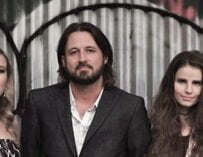
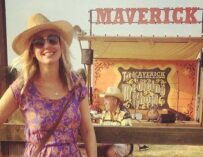

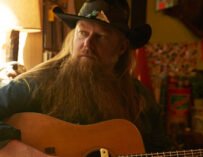

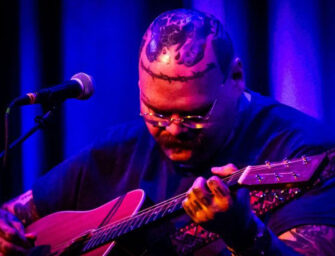


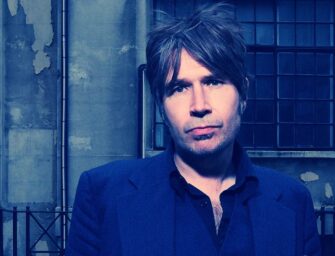























Related Articles